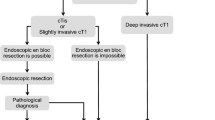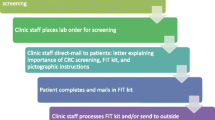Abstract
African Americans experience disproportionate incidence and mortality rates from colorectal cancer (CRC). This health disparity is partially explained by low participation in screening. This study aimed to identify factors influencing adherence to colorectal cancer screening among African Americans. Telephone interviews were conducted with African Americans living in Maryland (57% response rate). A total of 504 respondents agreed to participate. The survey primarily assessed participation in CRC screening, health beliefs and attitudes about CRC screening, and demographics. Nearly 77% of respondents reported being adherent to CRC screening guidelines. Of those not adherent, nearly 50% reported not ever receiving a physician recommendation to be screened. Having health insurance was a strong correlate of adherence. Study participants with greater perceived CRC risk were more likely to be adherent. Further, those who reported that they were caregivers were less likely to be adherent to screening. Findings indicate that those who were the primary care takers of children or disabled persons were less likely to participate in CRC screening. Efforts are needed to ensure that caregivers do not neglect their own preventive health, including CRC screening. Further, access to care and health insurance coverage also appear to be an important factor for participation in CRC screening. Ensuring that those who do not have adequate healthcare coverage are not excluded from participation in CRC screening due to cost should be an important priority if reduction in CRC health disparity is to be achieved.
Similar content being viewed by others
References
American Cancer Society. Cancer prevention and early detection facts and figures 2010. Available at: http://www.cancer.org/downloads/SIT/Cancer_Prev_and_Early_Dect_2010.pdf. Accessed: 1 June 2010.
Ries, L., Melbert, D., Krapcho, M., Stinchcomb, D., Howlader, N., Horner, M., et al. (2010). SEER cancer statistics review 1975–2005. Bethesda, MD: National Cancer Institute.
SEER*Stat Database: Incidence—SEER 17 Regs limited use + hurricane Katrina impacted Louisiana cases, Nov 2007 Sub (200–2005) <Katrina/Rita population> Adjustment—linked to county attributes—total US, 1969–2005 Counties: Surveillance, epidemiology, and end results (SEER) program. National Cancer Institute, DCCPS, Surveillance Research Program, Cancer Statistics Branch. 2008.
Jemal, A., Siegel, R., Ward, E., Hao, Y., Xu, J., Murray, T., et al. (2008). Cancer statistics, 2008. CA Cancer Journal for Clinicians, 58(2), 71–96.
Edwards, B. K., Kohler, B. A., Eheman, C., Zuber, A. G., Anderson, R. N., Jemal, A., et al. (2010). Annual report to the nation on the status of cancer, 1975–2006, featuring colorectal trends and impact of interventions (risk factors, screening, and treatment) to reduce future rates. Cancer, 116, 544–573.
Cress, R. D., Morris, C., Ellison, G. L., & Goodman, M. T. (2006). Secular changes in colorectal cancer incidence by subsite, stage at diagnosis, and race/ethnicity, 1992–2001. Cancer, 107(5 suppl), 1142–1152.
Ries, L., Melbert, D., & Krapcho, M., et al. (2008). SEER cancer statistics review 1975–2007. Available at: http://seer.cancer.gov/csr/1975-2005/, based on November 2007 SEER data submission, posted to the SEER web site. Bethesda, MD: National Cancer Institute.
Wu, X. C., Chen, V. W., Steele, B., et al. (2001). Sub-site specific incidence rate and stage of disease in colorectal cancer by race, gender, and age group in the United States, 1992–1997. Cancer, 92(10), 2454–2547.
Chien, C., Morimoto, L. M., Tom, J., & Ci, L. (2005). Differences in colorectal carcinoma stage and survival by race and ethnicity. Cancer, 104(3), 629–639.
American College of Gastroenterology. New recommendations by the American college of gastroenterology call for changes in colorectal cancer screening of African Americans. Available at: http://www.gi.org/media/releases/march212005.asp. Accessed: 7 June 2010.
Agarwal, S., Bhupinderjit, A., & Bhutani, M. S. (2005). Colorectal cancer in African Americans. American Journal of Gastroenterology, 100(3), 515–523.
Vlahov, D., Ahern, J., Vazquez, T., et al. (2005). Racial/ethnic differences in screening for colon cancer: Report from the New York cancer project. Ethnicity and Disease, 15(1), 73–86.
Polite, B. N., Dignam, J. J., & Olodade, O. I. (2005). Colorectal cancer and race: Understanding the differences in outcomes between African Americans and Whites. Medical Clinics of North America, 89(4), 771–793.
Kauh, J., Brawley, O. W., & Berger, M. (2007). Racial sisparities in colorectal cancer. Current Problems in Cancer, 31(3), 123–133.
Ward, E., Jemal, A., Cokkinides, V., et al. (2004). Cancer disparities by race/ethnicity and socioeconomic status. CA Cancer Journal for Clinicians, 54(2), 78–93.
Shokar, N. K., Carlson, C. A., & Weller, S. C. (2008). Factors associated with racial/ethnic differences in colorectal cancer screening. Journal of American Board of Family Medicine, 21, 414–426.
Ries, L. A. G., Harkin, D., & Krapcho, M., et al. (Eds.). Surveillance epidemiology and end results cancer statistics review, 1975–2003. National Cancer Institute. Accessed 17 March 2007. Available at: http://seer.cancer.gov/csr/1975 2003/.
Palmer, R. C., Midgette, L., & Dankwa, I. (2008). Colorectal screening and African Americans: Findings from a qualitative study. Cancer Control, 15(1), 72–79.
SEER*Stat Database: Incidence—SEER 9 Regs limited use, Nov 2007 Sub (1973–2005) <Katrina/Rita population> Adjustment—linked to county attributes—total US 1969–2005 counties: Surveillance, epidemiology, and end results (SEER) program (www.seer.cancer.gov). National Cancer Institute, DCCPS, Surveillance Research Program, Cancer Statistics Branch. 2008.
SEER*Stat Database: Incidence—SEER 13 Regs limited use + hurricane Katrina impacted Louisiana cases, Nov 2007 Sub (1992–2005) <Katrina/Rita population> Adjustment linked to county attributes—total US, 1969–2005 counties surveillance, epidemiology and end results (SEER) program (www.seer.cancer.gov). National Cancer Institute, DCCPS, Surveillance Research Program, Cancer Statistics Branch. 2008.
SEER*Stat Database: Mortality—all COD, aggregated with state, total US (1969–2005) Nov 2007 Sub (1992–2005) <Katrina/Rita population> Adjustment surveillance, epidemiology and end results (SEER) program (www.seer.cancer.gov). National Cancer Institute, DCCPS, Surveillance Research Program, Cancer Statistics Branch. 2008. (www.cdc.gov/nchs).
American Cancer Society. Colorectal cancer prevention and early detection: update 2008. Available at: http://www.cancer.org/acs/groups/content/documents/document/acspc-024469.pdf. Accessed 11 October 2010.
Janz, N. K., Champion, V. L., & Strecher, V. J. (2002). The health belief model. In K. Glanz, B. K. Rimer, & F. M. Lewis (Eds.), Health behavior and health education. San Francisco: Jossey-Bass.
Montano, D. E., & Kasprzyk, D. (2010). The theory of reasoned action and the theory of planned behavior. In K. Glanz, F. M. Lewis, & B. K. Rimer (Eds.), Health behavior, health education: Theory, research, practice (3rd ed.). San Francisco: Wiley.
Lipkus, I. M., Samsa, G. P., & Dement, J. (2003). Accuracy of self-reports of fecal occult blood tests and test results among individuals in the carpentry trade. Preventive Medicine, 37, 513–519.
Rakowski, W., & Breslau, E. S. (2004). Perspectives on behavioral and social science research on cancer screening. Cancer, 101(5 Suppl), 1118–1130.
Vernon, S. W., Myers, R. E., & Tilley, B. C. (1997). Development and validation of an instrument to measure factors related to colorectal cancer screening adherence. Cancer Epidemiology, 6, 825–832.
Jacobs, L. A. (2002). Health benefits of first-degree relatives of individuals with colorectal cancer and participation in health maintenance visits: A population-based study. Cancer Nursing, 25(4), 251–265.
SPSS Inc. (2009). SPSS software [computer program]. Version 17.0. Chicago, IL: SPSS Inc.
Agency for Healthcare Research and Quality. Guide to clinical preventive services 2010–2011 recommendations of the U.S. preventative services task force. 2010 August Report No. AHRQ Pub. No. 10-05145.
State of Maryland Department of Health and Mental Hygiene, Family Health Administration. Cancer Prevention, Education, Screening & Treatment Cigarette Restitution Fund Program. 2010.
CDC, National Center Chronic Disease Prevention and Health Promotion. (2008). Behavioral risk factor surveillance system prevalence trends and data Maryland 2008. Centers for disease control and prevention (CDC). Behavioral Risk factor surveillance system survey data. Atlanta, Georgia: U.S. Department of Health and Human Services, Centers for Disease Control and Prevention.
de Bosset, V., Atashili, J., Miller, W., & Pignone, M. (2008). Health insurance disparities in colorectal cancer screening in Virginia. Cancer Epidemiology, Biomarkers and Prevention, 17(4), 834–837.
Berry, J., Bumpers, K., & Ogulade, V. (2009). Explaining racial disparities in colorectal cancer care. Journal of Psychosocial Oncology, 27(1), 59–83.
Griffith, K., McGuire, D. B., Royak-Schaler, R., Plowden, K., & Steinberger, E. (2008). Influence of family history and prevention health behaviors on colorectal cancer screening in African Americans. Cancer, 113(2), 276–285.
Jones, R. M., Woolf, S. H., Cunningham, T. D., et al. (2010). The relative importance of patient reported barriers to colorectal cancer screening. American Journal of Preventive Medicine, 38(5), 499–507.
Coughlin, S. S., & Thompson, T. (2005). Physician for CRC screening by race, ethnicity and health insurance status among men and women in the US, 2000. Health Promotion Practice, 6, 369–378.
Torke, A. M., Corbie-Smith, G. M., & Branch, W. (2004). African American patients’ perspectives on medical decision making. Archives of Internal Medicine, 164(5), 525–530.
Lee, S., Colditz, G., Beckman, L., & Kawahi, I. (2003). Caregiving to children and grandchildren and risk of coronary heart disease in women. American Journal of Public Health, 93(11), 1939–1944.
Chang, B. (2001). Mammography screening behavior in older women caregivers. Geriatrics Nursing, 22(1), 33–36.
McQueen, A., Vernon, S. W., Rothman, A. J., Norman, G. J., Myers, R. E., & Talley, B. C. (2010). Examining the role of perceived susceptibility on colorectal cancer screening intention and behavior. Annals of Behavioral Medicine, 40, 205–217.
Valera, A., Jandorf, L., & DuHamel, K. (2010). Understanding factors related to colorectal cancer (CRC) screening among urban Hispanics: Use of focus group methodology. Journal of Cancer Education, 25, 70–75.
Codori, A. M., Petersen, G. M., Miglioretti, D. L., & Boyd, P. (2001). Health beliefs and endoscopic screening for colorrectal cancer: Potential for cancer prevention. Preventive Medicine, 33, 128–136.
Manne, S., Markowitz, A., Winawer, S., et al. (2002). Correlates of colorectal cancer screening compliance and stage of adoption among siblings of individuals with early onset colorectal cancer. Health Psychology, 21(1), 3–15.
Gwede, C. K., William, C. M., Thomas, K. B., et al. (2010). Exploring disparities and variability in perceptions and self-reported colorectal cancer screening among three ethnic subgroups of U. S. Blacks. Oncology Nursing Forum, 37(5), 581–591.
Frey, J. H. (1989). Survey research by telephone (2nd ed.). Thousand Oaks (CA): Sage.
Acknowledgments
This research was sponsored by grants R03CA124215 and K22CA126979 from the National Cancer Institute.
Author information
Authors and Affiliations
Corresponding author
Rights and permissions
About this article
Cite this article
Palmer, R.C., Chhabra, D. & McKinney, S. Colorectal Cancer Screening Adherence in African–American Men and Women 50 Years of Age and Older Living in Maryland. J Community Health 36, 517–524 (2011). https://doi.org/10.1007/s10900-010-9336-4
Published:
Issue Date:
DOI: https://doi.org/10.1007/s10900-010-9336-4




